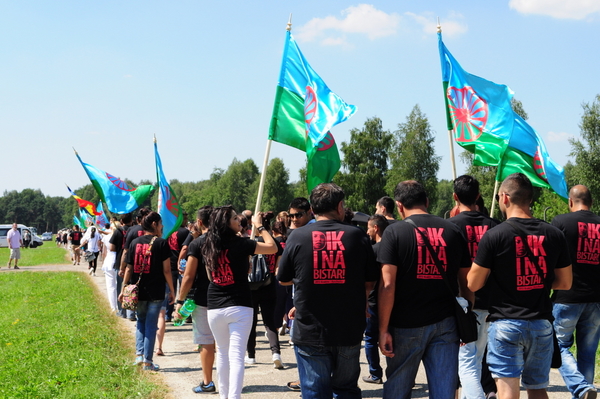The Commission issued today a statement in memory of the 80th anniversary of the tragic events that unfolded at the Auschwitz-Birkenau death camp on 2 August 1944.
On that day, over 4,300 Sinti and Roma children, women, and men were taken from barracks under the cover of darkness and led to the gas chambers by SS guards.
In a joint statement, Commission president Ursula von der Leyen, together with Commissioners Věra Jourová and Helena Dalli, wrote that it is the EU’s "duty to make sure their story is not forgotten and to honour their legacy by fighting for justice and equality for all racialised minority groups" that suffer from discrimination, stereotype and prejudice.
The day was chosen by the European Parliament in 2015 in memory of Roma people who were murdered in the gas chambers on 2 August 1944. They were among the over 500,000 thousand of victims of the Roma genocide by the Nazis and their collaborators during WWII.
In its statement, the Commission commits to remember the genocide against the Roma and “to recommit to a world where human dignity is upheld, where diversity is celebrated and where hatred has no place.”
A new project, RomaMemory, was launched by the EU and the Council of Europe in May 2024 and will be implemented during two years. It aims to raise awareness about the systematic persecution of Roma and the genocide on Roma during the Holocaust and thus to reinforce the fight against discrimination and antigypsyism.
To mark the European Holocaust Memorial Day for Roma and Sinti, the Roma Foundation for Europe and its network members are co-hosting a series of events in Krakow, Poland, including a conference, an exhibition and a visit to nearby Auschwitz-Birkenau.
“We've been building a memory of the atrocities committed against our ancestors in Auschwitz for 40 years, and recognition took just as long,” commented Zeljko Jovanovic, President of the Roma Foundation for Europe.
“It's still valid to say that public officials must move beyond crude electoral calculation and take action to ensure that memorials are built, schools educate, and the media broadcast the truth about the Roma genocide to help liberate us from the prison of past and present racism.”
He is not overly optimistic that this will happen considering that “our parliaments and governments are plagued by far-right and extremist politics”. The results in the recent European Elections were a disappointment for Roma, Europe's largest and most discriminated ethnic minority. The situation is almost the same since 2015 when the Parliament passed the resolution on the Memorial Day.
The outgoing European Parliament included four members of Roma origin, from Spain, Germany, Hungary and Slovakia, or about 0,5 % of the total. The incoming Parliament, with 720 members, will not include any Roma MEP.
Population figures are uncertain but according to the most quoted estimates, 10-12 million Roma are living in the EU and the candidate countries. The Commission has put in place a Roma Strategic framework for 2020 – 2030 but Roma continue to face high levels of discrimination and serious challenges in accessing equal rights and services in housing, education, employment and health care.
M. Apelblat
The Brussels Times

